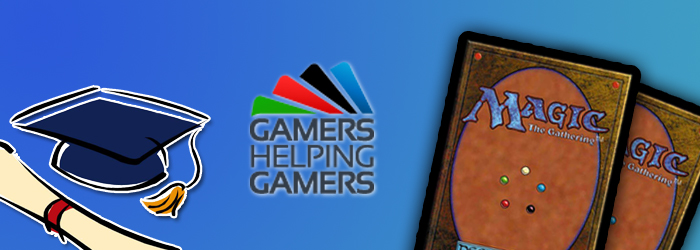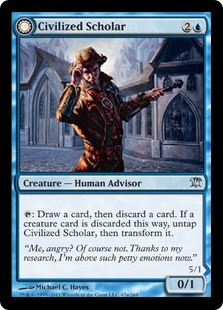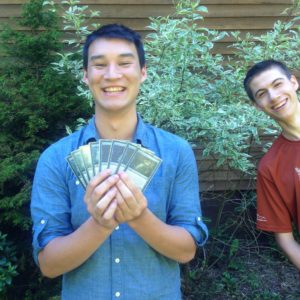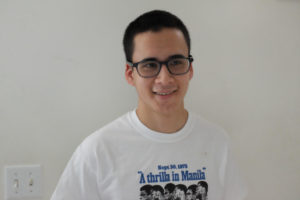
Meet the 2017 Gamers Helping Gamers Scholarship Winners
Posted by Brian David-Marshall | GamesFor more than half a decade Gamers Helping Gamers has been living up to its incredibly straightforward name. The non-profit organization was founded by a handful of Magic players who grew up playing games and has been awarding college scholarships to gamers since 2012. President Timothy McKenna has been poring over the recent slew of applications with his board of directors that include Eric Berger (Secretary), Jon Finkel (Treasurer), Chris Pikula, Robert Maher, Jr, Matthew Wang, and Daniel O’Mahoney-Schwartz. Also contributing to the selection process were Scholarship Committee members Worth Wollpert and Jamie Parke.
Past winners of the scholarship include:
2012: Dylan Fay, Douglas Johnson
2013: Isaac Goldstein
2014: Nathan Calvin, Brandi Mason, Kenneth Siry
2015: Lirek Kulik, Dylan Quinn
2016: Faolan Sugarman-Lash, Jacob Schliesman, Oliver Tiu
2017:… Without further ado
August Peterson
Age: 18
Hometown: Minneapolis, Minnesota
College: Grinnell College

You have to give Peterson credit for planning ahead. The Minneapolis based Magic player first became aware of the Gamers Helping Gamers scholarship program when his father read about the organization in the New York Times. Now half a decade after that article appeared he will be attending Grinnell College and hopes to graduate debt free thanks to that very scholarship.
“He had heard me talking about Jon Finkel and saw his name while reading the article and thought I might be interested,” explained Peterson who had already been playing Magic for a year or so after being introduced to it by his friend Connor.
“It really did not take much more than playing one game to get me hooked. After looking through Connor’s binder I already had ideas in my head for what types of decks I wanted to build. I had played chess and other card games before, but the higher complexity level of Magic is what made this game more interesting. There was so much that I didn’t yet understand and that made me want to play more Magic so I could continue to discover more of the interactions of the game,” recalled Peterson of his first encounter with the game.
With college looming, Peterson has taken a more fun approach to the game of late but fully embraced the competitive aspect throughout most of his teenage years. A typical day for him and his two friends, Max and Lewie, involved playtesting Modern or Standard in preparation for an upcoming event. Peterson attended at least one Grand Prix each year for the past three years but has turned his attention to playing a budget deck in Legacy and tuning his Commander deck.
“I considered my greatest accomplishment in Magic to be the Legacy Eggs deck I built and tested for over a year before playing it to a positive finish at an SCG Legacy Open,” said Peterson of his pet Legacy deck that is much more accessible than other decks in the format built around the premium staples in Legacy.
“Beyond being my favorite deck to play, it is very meaningful to me because of how much time I have put into working on it. Combo decks like Storm, High Tide, Eggs, Pros Bloom, Academy, etc. are my favorite. Building a version of Eggs for Legacy was a very fun and rewarding experience. I learned a lot about how these types of decks work in the process.”
The application process for Gamers Helping Gamers includes questions about favorite (and least favorite) cards and the innocuous Chromatic Star was Peterson’s choice for that discussion.
“I love cards that do close to nothing on their own, except for giving you a very small advantage. In a deck like Eggs you combine a bunch of these small advantages together into a large advantage that wins you the game. If you have no special interactions Chromatic Star just draws a card, but when you combine it with mechanics like Prowess, Affinity, Delve, and Delirium you get more out of it than just one card. The advantages gained from these synergies are small, but they add up over the course of the game.”
For least favorite card Peterson wrote about Banisher Priest and how the templating for the card does not allow for cool timing tricks like you can get under the old templating of similar cards like Fiend Hunter. Back in the old days of Magic you could respond to the enter the battlefield trigger of exiling a creature by sacrificing or bouncing the Fiend Hunter which would trigger the leaves the battlefield clause. Since no creature had been exiled yet that part would fizzle and then the enters the battlefield trigger would happen and the targeted creature would be exiled, never to return.
“I believe that the Fiend Hunter loophole is good for Magic. It rewards players for ingenuity and understanding of the rules. When a new player encounters this loophole and loses a game to it, there is an opportunity for discovery. This learning experience never happens with Banisher Priest,” griped Peterson (and frankly I can’t blame him!)
“It is an enormous help in making college affordable for me. I knew that paying for college would be a challenge and I am incredibly grateful for the help I am receiving from Gamers Helping Gamers. The scholarship means that I should be able to graduate without debt, greatly lessening the burden on me and my family. It is an honor to be selected to receive this scholarship by people I so greatly respect. Magic has meant a lot to me for the past six years or so and I have spent a lot of time and energy thinking about the game. To have some of the best minds from Magic consider my ideas worthy of a scholarship is very meaningful for me.”
While Peterson is much more likely to be playing his Karador deck in a weekly Commander game than chasing down PPTQs he stays on top of the game and closely follows the competitive scene — and is always ready to watch GHG’s Jon Finkel stream some Storm action.
“Beyond being a legendary player, and a very good person, I admire him for his dedication to Storm in Modern. I too am a Storm player and I will pause videos of him playing the deck and ask myself what play I would make so I can compare it to his play,” said the avid consumer of streamed Magic content. “I also follow LSV, Conley Woods, Caleb Durward, Andrew Cuneo, Joel Larsson, and Andrea Mengucci.”
A couple of other players Peterson singled out were Sam Black and Frank Karsten.
“Building decks is my favorite part of Magic and one way I improve my skills is by watching how he builds decks. One thing that brought me into playing more competitive Magic was watching his deck The Aristocrats win Pro Tour Gatecrash in the hands of Tom Martell. I have gone back to watch that match at least five times,” said Peterson of Magic’s mad genius Sam Black.
As Peterson embarks on his college years he is already thinking about how he can make an impact on the world — and how there might be something we can take from metagaming and apply towards politics.
“The last thing I wrote about was my belief that our approach to solving problems in politics should be more like how the Magic community approaches a new Standard format. Players work together and test their ideas, recognizing other’s successes and their own failures. At the end of the season there is a general consensus on what the best deck was. There is no such recognition of success of others and failure of self in American Politics. There is generally no consensus, just ideology.”
Autumn Cook
Age: 18
Hometown: Rockville, Maryland
College: University of Maryland Baltimore County
Autumn Cook has been playing Magic for more than half her life after being introduced to it by her older brother when she was 8 years old. It all started with a stack of cards he brought home from a friend’s house.
“I thought the art on the cards was awesome and having played a few other card games very casually, I forced him to teach me to play. I was in love pretty much instantly, and continued to play even after my brother stopped,” recalled Cook who assured readers of the truism that nobody truly quits the game; even her brother. “He recently restarted again, and is having a blast.”
As she entered her teens she found her lane in Magic. Cook had begun attending tournaments on the Star City Open Series and realized she was not having as much fun as she expected playing in large tournaments.
“I realized that maybe that playing in large competitive tournaments probably wasn’t for me. However, I noticed another group of people that seemed to be absolutely loving the events they went to, and that group of people were the judges. I certified as Level One less than a year later at 14. I continued to work large events and leveled up to level two a little less than a year later at Grand Prix Baltimore 2014,” said Cook of the path that led her to judging. “The judging community is amazing, and it is one of the main reasons why I keep playing Magic and judging tournaments. They are family, and I love them.”
Watching coverage of Jon Finkel playing at a Pro Tour and the Judge community combined to inspire Cook to apply for the scholarship.
“I think I learned about GHG by following Magic coverage. Every time Jon was on camera the commentators mentioned GHG and the rest was history. People in the judge program also encouraged me to apply for the scholarship. Word of mouth is a really powerful tool!”
Her favorite card mechanic no doubt warmed Jon Finkel’s blue heart.
“My favorite Magic mechanic is the concept of drawing cards. In my opinion there isn’t another mechanic in Magic that has the ability to completely change the course of the game. The one top deck Cruel Ultimatum can completely swing the game in Gabriel Nassif’s favor, or induce the amount of emotion that comes attributed with Craig Jones’ Lightning Helix or the miracle Bonfire of the Damned against Brian Kibler’s team. This variance is what keeps the game fresh and lively, and it is what makes every game of Magic different. I talked the concepts of cantrips and how the addition of drawing cards makes a card inherently better.”
For Cook even the physical act of card-drawing offers some insight into the various personalities that make up Magic’s tapestry.
“I also believe that the way players draw a card — from a sideways deck straight to the hand, or the slow-roll drag across the table, or the “pure” way that Reid Duke draws his cards — can represent the diversity in the game. People can do even the most simple and arguably most integral part of a game of Magic so differently, even though we are all playing the same game, and performing the same game action.”
Fittingly for a Magic judge an obscure but now obsolete rules fix was singled out by Cook for least-beloved mechanic.
“I wrote about an ability called Substance. People probably don’t even know what this ability does, because it is one of the only abilities in the game to never have shown up on a card. Substance was an ability that was created to solve a problem that the 6th edition rules change caused regarding the cleanup step and how some cards functioned during the cleanup step. I’ll spare you the lengthy explanation on how it actually works, but it was pretty funky. Substance was eradicated from the oracle text of the 12 Magic cards it was on following the Magic 2010 Core Set Rules Changes. I dislike Substance because while it was a fix that worked and fixed the problem, Substance as a whole was unnecessarily confusing and complex — None of the 12 cards that had Substance actually saw play.”
“I am incredibly competitive,” said Cook who still tries to find time to play her favorite Magic format. “My absolute favorite is Legacy where my main deck is Enchantress — a couple of different builds, but I am currently running Bant-chantress. I love the deck so much that I have foiled/white bordered the majority of the deck. Even though I’m super competitive, I still play bad decks — I did get a Top 16 in a recent SCG Legacy Classic though!”
When asked about which Magic players or personalities she admires Cook rattled off a list of judges that she works with including Eric Dustin Brown, Brogan King, Liz Richardson, Nicholas Sabin, and Riki Hayashi.
“My absolute favorite streamers and Magic personalities are Emma Handy (@em_teegee) and Jadine Klomparens (@thequietfish). I am a mod in Emma’s channel, and try to tune into every stream that I possibly can. She is an amazing person and an amazing pillar in the community.”
Applicants were asked to talk about how the experience of Magic could be applied in a broader way to “real life” and Cook chose a topic most Magic players know all too well — the concept of “tilt”.
“Bad things happen to good people in real life, just as terrible draws happen to amazing players in Magic. But I believe that it is important to learn from your previous mistakes and to carry on. If someone allows themselves to be tilted by things that don’t go their way, they will never continue to grow and mature. Competitive Magic players have to learn how to deal with tilt in a tournament environment. I believe that that same lesson can be applied to literally every aspect of “real life.””
With real life beckoning for Cook the Gamers Helping Gamers scholarship has Cook looking past her immediate college experience.
“This scholarship is going to help me continue on to graduate school. My intended major is Chemistry, and I hope to go on to earn a MD/Ph.D after I graduate from UMBC. This scholarship will help me achieve those goals. But this scholarship is a lot more than money. This organization is a huge deal within the Magic the Gathering community and being picked as one of the recipients is a huge, huge honor. I won’t let you guys down. Thank you so much to all of the people who support GHG and to the amazing leadership team at GHG.”
You can expect to see Cook playing over the summer at SCG Richmond and just maybe Grand Prix DC in September but if you see an Enchantress deck going 5-0 in an Legacy League on MTGO there is a good chance it will be Autumn Cook.
If you want to find out more about Gamers Helping Gamers, whether it is to donate, find out information about upcoming application windows, or to find out about upcoming fundraising tournament events just go to their website.






